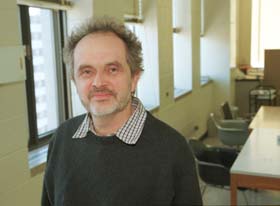
| ||
 | ||
 Professor Thomas Shultz PHOTO: OWEN EGAN |
Choosing the lesser evil
|
SYLVAIN COMEAU | What separates our species from the animals? Not just the ability to make rational choices, but the ability to rationalize our choices.
A recent study by psychology professor Thomas Shultz suggests that tough decisions are rarely made without some revisionist post mortem. The reason for most rationalizations is what psychologists call cognitive dissonance. "The area of cognitive dissonance has been one of the most important in social psychology in the past 30 years. Cognitive dissonance is a kind of psychological discomfort people feel when they see inconsistencies between attitudes and beliefs that they hold. It is a motivating force, encouraging people to change their evaluations and beliefs to make them more consistent." According to Shultz, studies on cognitive dissonance have generated over 1,000 research papers. Shultz's paper, published in a recent issue of Colgate University's Personality and Social Psychology Bulletin, details an experiment in which 13-year-olds were given a choice between two posters which the youths had earlier rated as desirable, and between two which they had given a low rating. A choice between desirable posters produced a large decrease in liking for the rejected poster, while a choice between undesirable posters produced a large increase in liking for the chosen poster. Although he acknowledges that rationalization can be dangerous, allowing someone to internally rubber stamp a bad decision, Shultz says that it is essentially a coping mechanism that helps people live with their choices. "This is particularly true in the case of irreversible decisions. Otherwise, people would be miserable much of the time." Learning comes into play in the case of reversible decisions. "If they made a bad choice, people can decide to make a better one next time, as an alternative to rationalization." What about people who endlessly put off making a choice? Shultz says that they may fear the dilemma of choosing. "Procrastinators are trying to avoid the psychological discomfort involved with cognitive dissonance. They may have difficulty rationalizing because they can see very clearly both the good and bad sides of each alternative." Shultz says that the ongoing work on cognitive dissonance, including his own, is overturning previous assumptions about the mental processes involved in decision making. "Before experiments on cognitive dissonance, the assumption among psychologists was that most of the work was done by the individual before a choice was made, and that nothing interesting happens afterwards. Now we know that there is a lot of cognitive activity after a decision, as well." The innovation in Shultz's study was in presenting a "lesser of two evils" choice between two alternatives. "That aspect has not been done before, perhaps because people prefer to think that choices are always between pleasant alternatives." The paper mentions some real-life examples of the latter case, of "lesser evil" choices: elections in which none of the candidates enjoy much popular support (such as the last mayoral race in Montreal), and low income earners who have to shop for low quality items. Shultz says that marketers might use the results, for example, by distinguishing a low quality item as the best in its category, rather than just the cheapest. Another new aspect is that the study was computationally precise; the results were accurately predicted by a computer model. "We programmed the model to simulate human behaviour by reducing contradictions in its assumptions. The model can also be used to generate new predictions." Shultz conducted the study, and wrote the paper, with undergraduate student Elène Léveillé (now a graduate student at UQAM) and Stanford University psychology professor Mark R. Lepper.
|
|
| |||||